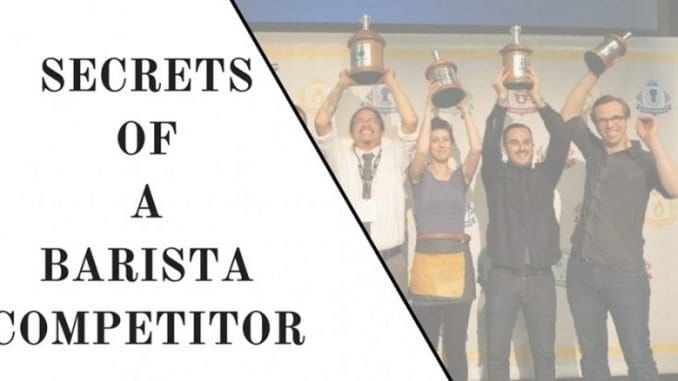
In this series we typically share the secrets of barista competitors, but this week we take a step back and look to our judges for advice, insights, and tips on how they operate and how to utilize their perspectives to compete.
BY DIANA MNATSAKANYAN-SAPP
SPECIAL TO BARISTA MAGAZINE
They wear aprons, carry around clipboards, shake a lot of hands, and look very serious. But what’s happening behind the judges’ curtain that we don’t know about? Barista Magazine writer and first-time Knoxville CoffeeChamps Tech Judge Diana Mnatsakanyan-Sapp shares her judging experiences and insights below.
- The first secret to tech judging is that there are very few secrets.
It’s hard to keep secrets when every rule and score sheet is available online, a transparency I deeply appreciate about the Coffee Championships. Volunteering as a tech judge leaves little room for gray areas. My job is to time the shots, watch for coffee waste, record every movement, and try not to get in the way of the competitor. A series of checks and balances exists to keep baby judges like myself on track: Head judges, co-judges, and calibration discussions provide learning opportunities and a way to ensure that we’re all on the same page—every competitor, every time. We give the score sheets to our competitors, we make ourselves available for conversation at the end of each competition, we answer their questions and share our thought processes. It’s a very open and honest system.
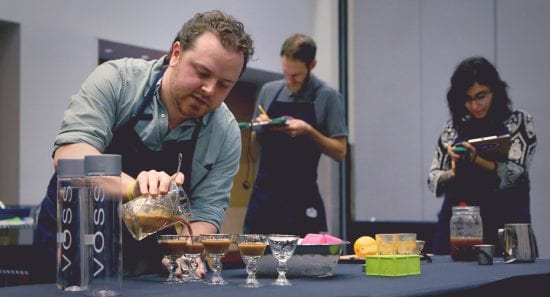
- The second secret is that we are very adept scribblers.
In grade school I was chastised by my teachers for doodling over all my papers, but after the first judges’ calibration I wanted to call them up to shout, “Look at me now!”
The only way for a tech judge to accurately assess consistency in technique is to record all movements during competition. Each settling of the portafilter, each spin of the tamper, and each flick of the wrist must be written down. As the days wore on I developed a series of unique scribbles and shorthand to record these quick, small, and occasionally unpredictable motions. Squiggles, dashes, abbreviations, and tick marks covered my score sheets from top to bottom. I was Diana the Doodle Queen.
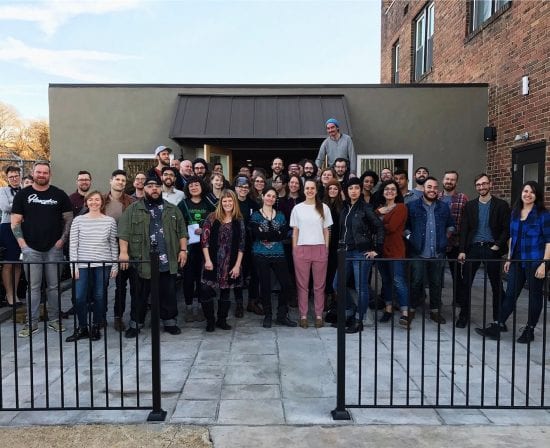
- The third secret is that tech judges live the good life.
Tech judges can eat whatever they want, drink whatever they want, smoke cigarettes* and party like it’s 1999 because we don’t have to worry about hurting our palates like the sensory judges do. As long as we wear comfortable shoes and ergonomic clothing, we’re in the clear.
*Don’t smoke cigarettes, they’re bad for you.
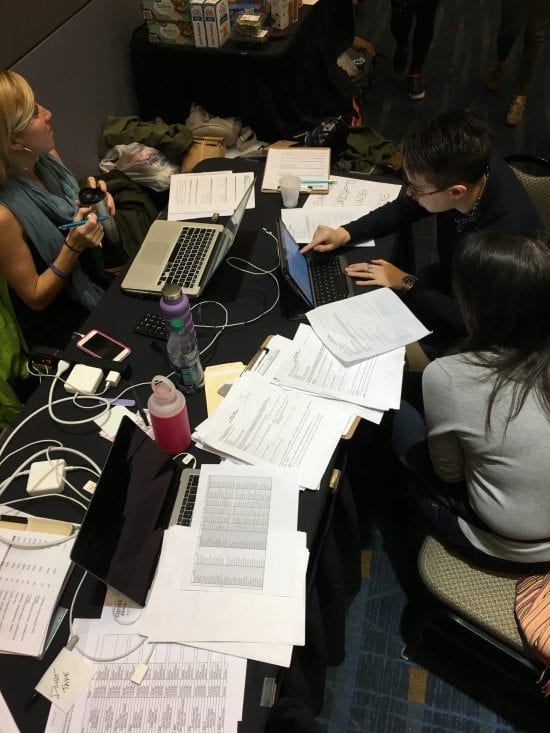
- The fourth secret is that we get weird about our gadgets.
While in Knoxville I witnessed plenty of quirky judge habits. Some judges brought their own stopwatches from home. Other judges swore by the rubbery stopwatches, whispering to me on Calibration Day that I needed to show up early to get a set of them for myself before they disappeared. One judge built his own clipboard so that it could hold pencils better. I laughed at them at first, but by the end of the qualifying event I was searching for stopwatches on Amazon.
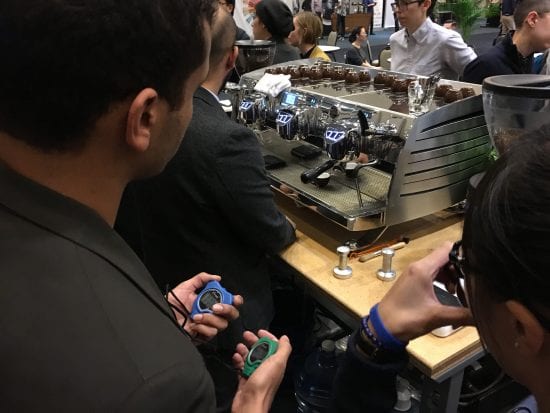
- The fifth secret is that snacks make a judge’s world go round.
Many judges had long days full of assignments, with only a handful of breaks in between competitors. These lovely, patient volunteer judges hustled through the day on granola bars, oranges, and soup in a carton. That snack table kept us going and helped us stay committed to being a part of CoffeeChamps’ success. (I also managed to stay pretty committed to the Hershey’s chocolate bars left over from Calibration Day.)
- The sixth secret is that tech judging makes you a better barista.
As a trainer and cafe manager, I spend most of my days watching my baristas’ movements. I analyze their motions in search for the most consistent and efficient way to conduct service. Is their tamping even? Are they maintaining a clean, neat workspace? Do they look like they’re losing their minds out there?
Tech judging was like being a barista manager, but amplified. I didn’t have the leisure of standing to the side of my bar while casually observing my employees’ work. Instead I was on a stage, obsessively focusing on every detail because there would be no re-runs if I missed a single moment. With that much pressure, you develop an acute, hyper-focused sensitivity to the competitor in front of you. You don’t see or hear anything besides the presentation. For the first time in my life I felt like I had Spidey Senses, and it was wonderful.
I also had the benefit of working alongside a number of very seasoned judges. I was probably a pretty annoying newbie judge—asking an endless line of questions in each calibration—but I was continually received with patience and understanding. I wasn’t just given answers outright, but challenged to think more critically and be better each time I stepped onstage. I was able to watch my head judges, study their movements, and begin to pick up some of their habits as time went on.
Since returning from judging CoffeeChamps, I’ve found myself more attuned to myself and my baristas, more focused when I work, more consistent in my motions, and far less wasteful than I’ve ever been before.
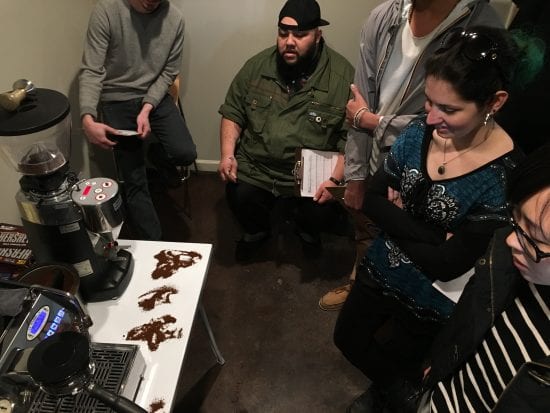
- The seventh secret is that judging is a responsibility and a privilege.
Coffee professionals spend months training for the few minutes they spend onstage. Countless hours of experimentation, research, testing, tasting, revising, and obsessing culminate into this single presentation they give. It is the responsibility of the judges to give each competitor an equal chance at success, and in order to do so we must be focused, attentive, and respectful of the journey each person has made to get to that stage. It’s a huge responsibility and privilege that no judge takes for granted.
I was continuously inspired by the hard work and dedication I saw behind the judges’ curtain. Head judges were endlessly helpful and informative, guiding new volunteers and facilitating thought-provoking conversations in the judges’ circle. Volunteers scurried back and forth, organizing and tallying scores throughout the day. Many of these people sacrificed their time, meals, and dance cards to help keep the show running. Despite that, everyone seemed downright thrilled to be a part of CoffeeChamps (myself included). For every passionate competitor in attendance there was a team of dedicated, focused volunteers working just as passionately to help make these competitors’ dreams a reality.
Tech judging at CoffeeChamps in Knoxville was one of the most formative, fun, and challenging experiences of my coffee career, and I’m already counting down the days until I get to do it again in Seattle for the USBC! If you see me out and about at Expo, please come say hello and introduce yourself—I might be a little hangry, but I’ll definitely be glad to meet you.
 ABOUT THE AUTHOR
ABOUT THE AUTHOR
Diana Mnatsakanyan-Sapp is the Co-Creator and Director of Coffee at Undercurrent Coffee in Charlotte, N.C. She is SCA Barista L1, L2, Examiner, and IDP certified, and can be reached at diana@undercurrentcoffee.com.

